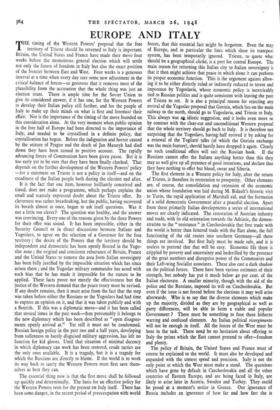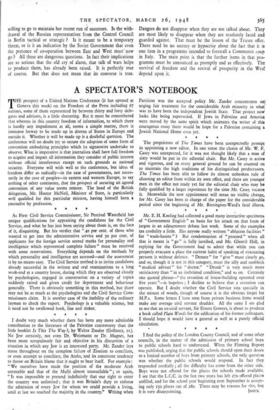EUROPE AND ITALY
THE timing of the Western Powers' proposal that the free territory of Trieste should be returned to Italy is important. Britain, the United States and France have made their move four weeks before the momentous general election which will settle not only the future of freedom in Italy but also the exact position of the frontier between East and West. Four weeks is a generous interval at a time when every day sees some new adjustment in the critical balance of forces—so generous that it removes most of the plausibility from the accusation that the whole thing was just an election stunt. There is ample time for the Soviet Union to give its considered answer, if it has one, for the Western Powers to develop their Italian policy still further, and for the people of Italy to make up their minds on what is first and foremost their affair. Nor is the importance of the timing of the move founded on this consideration alone. At the very moment when public opinion in the free half of Europe had been directed to the importance of Italy, and needed to be crystallised in a definite policy, that crystallisation has begun. Before the indignation and horror caused by the seizure of Prague and the death of Jan Masaryk had died down they have been turned to positive account. The rapidly advancing forces of Communism have been given pause. But it is too early yet to be sure that they have been finally checked. That depends on the further development of the Western Powers' policy —for a statement on Trieste is not a policy in itself—and on the steadiness of the Italian people both during the election and after.
It is the fact that one item, however brilliantly conceived and timed, does not make a programme, which perhaps explains the small and scarcely expressed doubt about the Trieste offer. Its cleverness was rather breathtaking, but the public, having recovered its breath almost at once, began to ask itself questions. Was it not a little too clever? The question was healthy, and the answer was convincing. Every one of the reasons given by the three Powers for their offer was sound. It has been impossible, either in the Security Council or in direct discussions between Italians and Yugoslays, to agree on the selection of a Governor for the free territory ; the desire of the Powers that the territory should be independent and democratic has been openly flouted in the Yugo- slav zone ; the original and consistent reluctance of Britain, France and the United States to remove the area from Italian sovereignty has been fully justified by the impossible situation which has since arisen there ; and the Yugoslav military commander has acted with such bias that he has made it impossible for the statute to be applied. These facts prove not merely the effectiveness but the justice of the Western demand that the peace treaty must be revised. If any doubt remains, then it must arise from the fact that the step was taken before either the Russians or the Yugoslays had had time to express an opinion on it, and that it was taken publicly and with a flourish. If this was a diplomatic move—and it has been called that several times in the past week—then presumably it belongs to the new diplomacy which has been described as "open disagree- ments openly arrived at." Yet still it must not be condemned. Russian foreign policy in the past two and a half years, developing from sullenness to barely disguised military aggression, has left no function for kid gloves. Until that situation of minimal decency in which diplomacy can work has been restored, crude tactics are the only ones available. It is a tragedy, but it is a tragedy for which the Russians are directly to blame. If the world is to work its way back to sanity the Western Powers must first save them- selves as best they can.
The essential thing now is that the first move shall be followed up quickly and determinedly. The basis for an effective policy for the Western Powers rests for the present on Italy itself. There has been some danger, in the recent period of preoccupation with world forces, that this essential fact might be forgotten. Even the map of Europe, and in particular the lines which show its transport system, has been temporarily ignored. Trieste, to quote what should be a geographical cliché, is a port for central Europe. The main reason for returning this Italian city to Italian sovereignty is that it then might achieve that peace in which alone it can perform its proper economic function. This is the argument against allow- ing it to be either directly ruled or indirectly reduced to terror and impotence by Yugoslavia, whose economic policy is inextricably tied to Russian politics and is quite consistent with leaving the port of Trieste to rot. It is also a principal reason for rejecting any revival of the Yugoslav proposal that Gorizia, which lies on the main railway to the north, should go to Yugoslavia, and Trieste to Italy. This always was 4; idiotic suggestion, and it looks even more so by contrast with the clear-cut and unconditional Western proposal that the whole territory should go back to Italy. It is therefore not surprising that the Yugoslays, having half revived it by asking for a renewal of the Togliatti talks (of which the Gorizia exchange was the main feature), should hastily have dropped it again. Clearly no such conditional offers will suit the Russian book. If the Russians cannot offer the Italians anything better than this they may as well give up all pretence of good intentions, and declare that they have nothing to offer but blood, sweat and Siberia.
The first element in a Western policy for Italy, after the return of Trieste, is therefore its restoration to prosperity. Other elements are, of course, the consolidation and extension of the economic union whose foundation was laid during M. Bidault's historic visit to Turin, the rapid application of Marshall aid, and the formation of a solid democratic Government after a peaceful election. Apart from these primarily Italian developments a series of international moves are clearly indicated. The restoration of Austrian industry and trade, with its old orientation towards the Adriatic, the demon- stration to the " resistance " in Czechoslovakia that free trade with the world is better than fettered trade with the East alone, the full functioning of the old routes into southern Germany—all these things are involved. But first Italy must be made safe, and it is useless to pretend that that will be easy. Economic life there is crippled by poverty and uncertainty and bedevilled by the presence of the great numbers and disruptive power of the Communists and their Left-wing Socialist associates. These also cast a dark shadow on the political future. There have been various estimates of their strength, but nobody has put it much below 40 per cent. of the Italian electorate. A smaller minority, though with the aid of the police and the Russians, imposed its will on Czechoslovakia. But even if the issue is not forced before the elections it may well arise afterwards. Who is to say that the diverse elements which make up the majority, divided as they are by geographical as well as party differences, will be able to form a stable and popular Government ? There must be something to fuse these hitherto warring and confused elements. An Italian political risorgimento will not be enough in itself. All the forces of the West must be bent to the task. There need be no hesitation about offering to Italy the prizes which the East cannot pretend to offer—freedom and plenty.
The policy of Britain, the United States and France must of course be explained to the world. It must also be developed and expanded with the utmost speed and precision. Italy is not the only point at which the West must make a stand. The questions which have gone by default in Czechoslovakia and all the other countries of Eastern Europe, and are being faced in Italy, are likely to arise later in Austria, Sweden and Turkey. They could be posed at a moment's notice in Greece. Our ignorance of Russia includes an ignorance of how far and how fast she is willing to go to maintain her recent run of successes. Is the with- drawal of the Russian representatives from the Control Council in Berlin tactical or strategic ? Is it meant to be a temporary threat, or is it an indication by the Soviet Government that even the pretence of co-operation between East and West must now go ? All these are dangerous questions. In fact their implications are so serious that the old cry of alarm, that talk of wars helps to produce them, has already been raised. It is perfectly true of course. But that does not mean that its converse is true. Dangers do not disappear when they are not talked about. They are most likely to disappear when they are resolutely faced and guarded against. That must be the lesson of the Trieste offer. There need be no secrecy or hypocrisy about the fact that it is one item in a programme intended to forestall a Communist coup in Italy. The main point is that the further items in that pro- gramme must be announced as promptly and as effectively. The survival of freedom and the revival of prosperity in the West depend upon it.



































 Previous page
Previous page